
Alcohol use and the genesis of sleep disturbances can exert a strong negative pressure on already vulnerable physiological systems, leading to the onset of various illnesses and, although less important, decreased work performance. Although this study does not contain a very large sample, it provides further awareness of the importance of the negative impact of alcohol consumption on sleep quality in night workers. Alcohol use was assessed using a short form of the Alcohol Use Disorders Identification Test-Concise (AUDIT-C), a modified version of the 10-question Alcohol Use Disorders Identification Test (AUDIT) developed by the World Health Organization. This test is a brief self-reported alcohol screening test effective for assessing unhealthy alcohol use. This instrument is a 3-item survey with a total score ranging from 0 to 12 points. A score of 3 or more points on the AUDIT-C could indicate people who are at-risk drinkers or have alcohol use disorders.
FAQs about alcohol and sleep
While the association between sleep and alcohol use is bidirectional (Chakravorty et al., 2016), symptoms of insomnia seem to play a unique role in the development and maintenance of substance use disorders. Moreover, in the context of alcohol treatment, insomnia symptoms have been shown to precede and predict relapse to alcohol use (Brower et al., 2001; Malcolm et al., 2007; Smith et al., 2014). Thus, persistent insomnia symptoms may be barriers to effective, long-term recovery from AUD.
- Thus, women may be an important target for AUD and insomnia interventions in the future.
- In two studies, authors measured both ‘sleep quality’ and ‘insomnia symptoms.’ Given the overlap in these phenomena, scores were averaged to create an overall ‘sleep quality’ score that could be used in the meta-analysis.
- Preventive action through accurate worker history, including the administration of questionnaires to detect the presence of alcohol or sleep disorders, would help both the health of the worker and the increased safety of the worker and those working with them.
- Insomnia interventions improve sleep quality and reduce symptoms of depression among individuals with comorbid AUD.
- For example, only six of the nine studies in this review reported alcohol use outcomes; thus, we are unable to determine if other interventions had significant effects on rates of abstinence or relapse.
- Research shows that regular alcohol intake can reduce sleep quality over time, potentially causing issues such as insomnia.
Alcohol Dependence and Its Relationship With Insomnia and Other Sleep Disorders
Working on your sleep hygiene is another way to help prevent or reduce insomnia. These are changes you can make to your environment and routine to help promote sleep. A full understanding of the correlation between alcohol use and insomnia may provide a valuable and effective tool for assessing whether work performance is impaired.
- Although experts can’t be certain that alcohol directly causes insomnia, numerous studies have found a link between this sleep disorder and alcohol consumption.
- This may help many fall asleep on occasion; however, the use of alcohol, even a single serving, will make it more difficult for someone to reach deep sleep, also known as REM sleep.
- We analyzed the first available follow-up because prior research shows that both behavioral and pharmacological interventions for insomnia produce the strongest effects immediately post-treatment (Edinger et al., 2001; Jacobs et al., 2004).
- Symptoms of co-occurring disorders may heighten when you stop drinking alcohol.
- To determine the efficacy of behavioral and pharmacological interventions for insomnia among individuals with alcohol use disorder (AUD).
- Finally, only six studies provided outcome data for both sleep quality and alcohol abstinence.
- Based on the above premises, the purpose of this study was to firstly assess the association between night work and alcohol consumption and secondly the effect of alcohol on normal sleep, and the response to its use by people with insomnia disorder.
How does alcohol affect sleep?
People with co-occurring medical conditions have an even higher risk of developing insomnia and/or substance use disorder. This blog covers the connection between alcohol consumption and insomnia and how you can get help to treat both conditions. If you or a loved one are suffering from Insomnia that you believe is tied to an alcohol use disorder, then your problem is likely more severe than you realize.

In this manuscript we will adhere to the ICSD-3 classification for sleep disorders. Additionally, low-to-moderate alcohol consumption is always the best practice for minimizing sleep disruptions or health concerns. The CDC defines moderate drinking as two or fewer drinks for males, and one or fewer for females, in a given day. However, in the second half of a night’s sleep, alcohol diminishes the amount of REM sleep. Alcohol’s negative effects on sleep quality worsen after several nights of drinking. Consuming alcohol causes physiological changes that affect snorers and people with obstructive sleep https://ecosoberhouse.com/ apnea (OSA), which occurs when tissues in the nose or throat collapse and temporarily obstruct the airway.


Compared to controls, insomnia intervention participants also showed significant decreases in symptoms of depression. Notably, the three behavioral intervention trials that reported depressive symptom outcomes were testing the efficacy of CBT-I. Consistent with previous studies (Clarke et al., 2015; Manber et al., 2008), CBT-I reduced symptoms of depression among individuals with comorbid AUD, with effect sizes ranging from small to large. Given the prevalence of depressive symptoms among patients with AUD (SAMHSA, 2016) and the promise of these findings, additional studies examining the impact of CBT-I on psychiatric outcomes among patients with AUD alcohol insomnia are warranted. The present research sought to examine differences in alcohol consumption and insomnia disorder among work groups with different work schedules. In addition, we investigated the links between alcohol consumption and insomnia.
- Sleep problems are often viewed as one of the last things to improve among people in alcohol recovery.
- This study investigated the frequencies of insomnia and its self-medication with alcohol in a sample of alcoholic patients, as well as the relationship of these variables to alcoholic relapse.
- REM sleep is characterized by increased brain activity, relaxation of the body, rapid eye movements, and increased dreaming.
- Notably, PMR also demonstrated strong effects on sleep quality and was included as a part of the intervention in at least one CBT-I trial.
- While Insomnia can lead to a dependency on alcohol, the opposite, like many mental disorders, is also true.
- Being a sedative and depressant of the central nervous system, alcohol can increase feelings of tiredness and sluggishness.
- Rarely is it the cravings of alcohol that drive those in recovery to relapse.